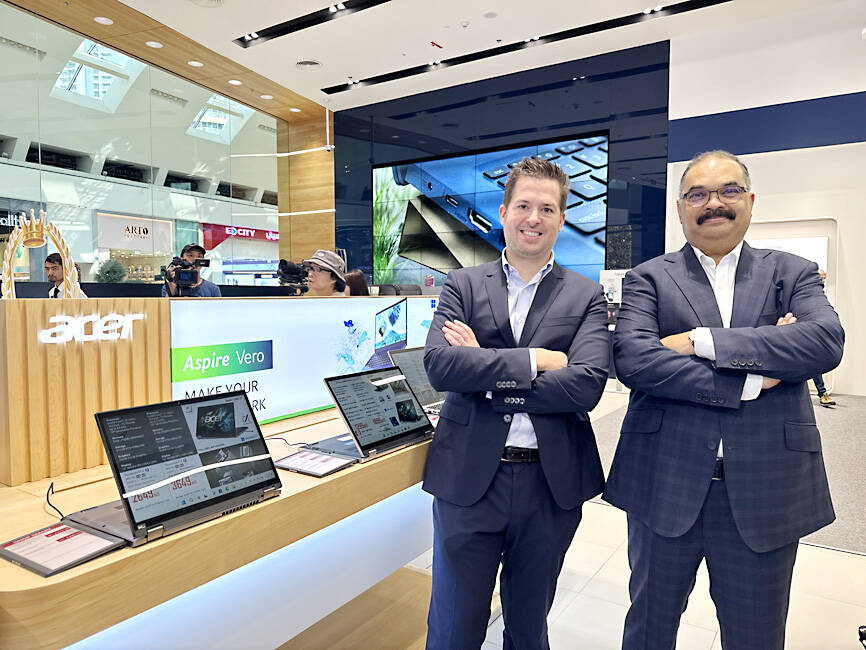PC brand Acer Inc (宏碁) on Thursday unveiled a new laptop that features artificial intelligence (AI) technologies.
The latest Swift Go 14 is powered by Intel Core Ultra processors, which include the new integrated neural processing Deep Learning Boost architecture to “deliver optimized performance and immersive experiences for gaming and content creation,” Acer said in a statement.
The new laptop elevates users’ streaming and videoconferencing experiences because its 1440p QHD webcam responds better and consumes less power from the device with AI-supported technology, helping extend its battery life to 12.5 hours, Acer said.

Photo: CNA
The user experience has also been improved by Acer PurifiedVoice technology, which removes unwanted noises, and Acer PurifiedView, which enables background blurring, automatic framing and gaze correction, it said.
The device can also convert 2D images into 3D animated wallpapers, thanks to the new Acer AlterView, which utilizes AI-generated depth maps, it said.
“Our new Swift Go 14 goes beyond its stylish design and high-resolution display, delivering the latest suite of collaboration technology to support a wide variety of functions and lifestyles,” Acer’s notebooks department general manager James Lin (林恭正) said.
“The Swift Go 14 is one of the first devices in the market to be outfitted with Intel Core Ultra processors, paving the way to enhance support of generative AI tasks on more Acer devices moving forward,” he said.
The Swift Go 14 has a starting price of NT$34,900 in Taiwan, and is set to be available in North America next month, starting at US$799.99, the company said.

WEAKER ACTIVITY: The sharpest deterioration was seen in the electronics and optical components sector, with the production index falling 13.2 points to 44.5 Taiwan’s manufacturing sector last month contracted for a second consecutive month, with the purchasing managers’ index (PMI) slipping to 48, reflecting ongoing caution over trade uncertainties, the Chung-Hua Institution for Economic Research (CIER, 中華經濟研究院) said yesterday. The decline reflects growing caution among companies amid uncertainty surrounding US tariffs, semiconductor duties and automotive import levies, and it is also likely linked to fading front-loading activity, CIER president Lien Hsien-ming (連賢明) said. “Some clients have started shifting orders to Southeast Asian countries where tariff regimes are already clear,” Lien told a news conference. Firms across the supply chain are also lowering stock levels to mitigate

Six Taiwanese companies, including contract chipmaker Taiwan Semiconductor Manufacturing Co (TSMC, 台積電), made the 2025 Fortune Global 500 list of the world’s largest firms by revenue. In a report published by New York-based Fortune magazine on Tuesday, Hon Hai Precision Industry Co (鴻海精密), also known as Foxconn Technology Group (富士康科技集團), ranked highest among Taiwanese firms, placing 28th with revenue of US$213.69 billion. Up 60 spots from last year, TSMC rose to No. 126 with US$90.16 billion in revenue, followed by Quanta Computer Inc (廣達) at 348th, Pegatron Corp (和碩) at 461st, CPC Corp, Taiwan (台灣中油) at 494th and Wistron Corp (緯創) at

NEGOTIATIONS: Semiconductors play an outsized role in Taiwan’s industrial and economic development and are a major driver of the Taiwan-US trade imbalance With US President Donald Trump threatening to impose tariffs on semiconductors, Taiwan is expected to face a significant challenge, as information and communications technology (ICT) products account for more than 70 percent of its exports to the US, Chung-Hua Institution for Economic Research (CIER, 中華經濟研究院) president Lien Hsien-ming (連賢明) said on Friday. Compared with other countries, semiconductors play a disproportionately large role in Taiwan’s industrial and economic development, Lien said. As the sixth-largest contributor to the US trade deficit, Taiwan recorded a US$73.9 billion trade surplus with the US last year — up from US$47.8 billion in 2023 — driven by strong

ASE Technology Holding Co (ASE, 日月光投控), the world’s biggest chip assembly and testing service provider, yesterday said it would boost equipment capital expenditure by up to 16 percent for this year to cope with strong customer demand for artificial intelligence (AI) applications. Aside from AI, a growing demand for semiconductors used in the automotive and industrial sectors is to drive ASE’s capacity next year, the Kaohsiung-based company said. “We do see the disparity between AI and other general sectors, and that pretty much aligns the scenario in the first half of this year,” ASE chief operating officer Tien Wu (吳田玉) told an